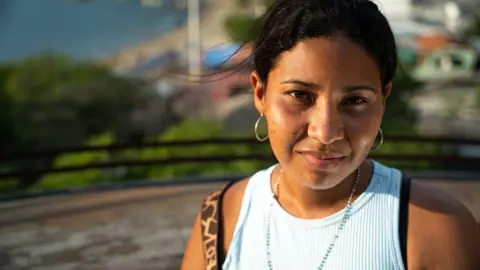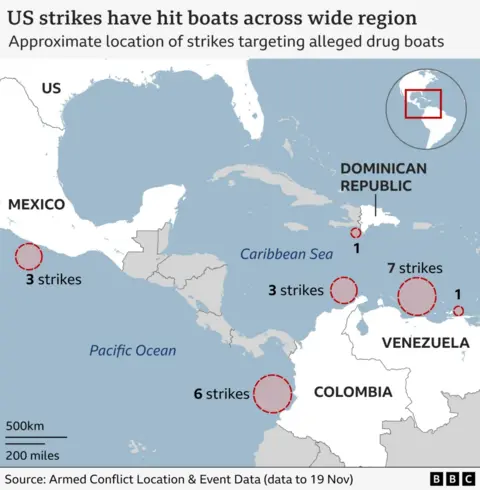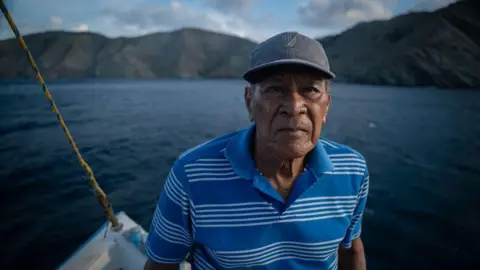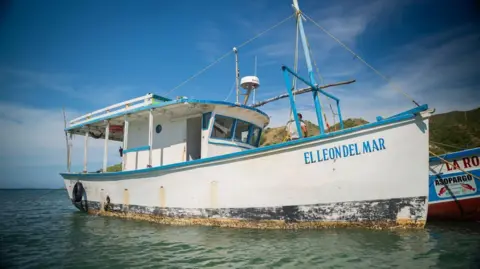Ione WellsSouth America correspondent, in Colombia
 BBC
BBCLizbeth Perez looks fearful as she gazes out onto the postcard-perfect fishing bay of Taganga, on Colombia’s Caribbean coast, recalling the moment she last spoke to her uncle in September.
“He was a kind man, a good person, a friend. A good father, uncle son. He was a cheerful person. He loved his work and his fishing.”
Alejandro Carranza said goodbye to his family early on the morning on 14 September, before going out on his boat as usual, his cousin Audenis Manjarres told state media. He left from La Guajira, a region in neighbouring Venezuela, he said.
The next day, US President Donald Trump announced that a US strike in international waters had targeted a vessel which had departed Venezuela, and that three people he described as “extraordinarily violent drug-trafficking cartels and narco-terrorists” were killed.
Ms Perez has not seen her uncle since. His five children are missing their dad, she says, and the family are still waiting anxiously for answers, not knowing if he was even on the boat hit in the strike.
“The truth is we don’t know it was him, we don’t have any proof that it was him, apart from what we saw on the news.”
The US began striking alleged drug-trafficking boats in the Caribbean in September, before expanding the operation to the Pacific. So far 83 people have been killed in at least 21 strikes, according to US statements.
US Defence Secretary Pete Hegseth says that the campaign is aimed at removing “narco-terrorists from our hemisphere” and securing the US from “the drugs that are killing our people”.
The Trump administration justifies them as a necessary self-defence measure aimed at saving American lives by stopping drugs from entering the US.
But the strikes have attracted condemnation in countries in the region and concern that they breach international law.
Colombia’s President Gustavo Petro has criticised the strikes, saying Colombian citizens were on board the boat hit on 15 September, and later claiming Mr Carranza was among those killed.
Responding to his first statement about Colombian citizens being killed, the White House said it looked forward to President Petro “publicly retracting his baseless and reprehensible statement”.
Trump has also accused Petro of encouraging the production of drugs and threated to cut off US aid to Colombia.

Mr Carranza comes from a huge family, living with about 20 relatives in a small house off a dirt track in the fishing village of Gaira.
Earlier this month, Petro alleged that he wanted to help his daughter study at university, and so accepted a payment from a drug trafficker to transport some drugs to an island, when his boat was struck.
“But whether it was fish or cocaine [he was transporting], he wasn’t subject to the death penalty,” Petro said. He accused the US of “murder” and since said he ordered Colombian public security forces to suspend intelligence sharing with the US until the strikes end. His defence minister later said the president had given “clear instructions to maintain, as has been done, a continuous flow of information with international agencies to combat drug trafficking”.
Mr Carranza has a past criminal record over stealing weapons from the police nine years ago, but his family deny – and say they are hurt by – characterisations of him as a narco-trafficker.
“What the president of the United States is doing isn’t right. He has to prove if they are or aren’t [trafficking],” Lizbeth says.
She says while Trump may want to tackle issues affecting his “territory” that “doesn’t mean he should resort to these methods… of taking someone’s life”.
A US lawyer working for some of Mr Carranza’s family, Daniel Kovalik, who also works for President Petro, says Mr Carranza’s wife and older daughter recognised his boat from the US-released footage of the strike.
He intends to sue the US government on the family’s behalf. International law says the military cannot kill civilians unless they pose an imminent threat of violence, even if engaging in criminal activity.
“Even if you claim that the people you’re killing are trafficking drugs, you don’t have the right to just engage in extrajudicial killings,” Mr Kovalik said.
“They’re tiny boats… If you really believe they were doing something wrong, those people should be arrested, tried in a court of law, convicted, and sentenced.”
“And, by the way, none of them would be sentenced to the death penalty – this is not a capital crime.”
The Trump administration has told Congress that it believes the US is in a “non-international armed conflict” with drug cartels in the region.
In doing so, it appears to be invoking war-time powers, such as killing enemy combatants even if they pose no immediate violent threat, to justify the strikes.
President Trump and Secretary of State Marco Rubio have said the US is “under threat” from “terrorist organisations” and said drugs kill thousands of Americans.
The US Drug Enforcement Administration (DEA) says seizures of cocaine – the major drug trafficked and produced in South America – rose by about 18% in 2024 compared to the previous year.
But the main driver of drug deaths in the US is Fentanyl, which is produced and arrives in the US from Mexico.
Mr Kovalik does not buy the US’s self-defence argument, saying “these boats have never attacked the United States”.

Back in Taganga, the strikes are causing apprehension for fishermen like 81-year-old Juan Assis Tejeda, whose skin is tanned and leathered from 70 years fishing these waters under the Caribbean’s baking sun – just like his grandfather and father before him.
He regularly fishes near the border with Venezuela, just along the coast.
He describes how he has sometimes seen drones flying over them while out fishing that “hover quietly, come back again, and disappear”.
Even though he is just fishing, he is now fearful because of the ongoing strikes.
“At any moment they could see us and think we’re doing the same thing. Because sometimes we also go 60 miles or so out to sea, looking for tuna.”
He says some fishermen do get involved in transporting drugs due to poverty. He says he was once offered money himself, but he said no.
He would prefer to stick to the little money that he earns and live “peacefully” than run the risks associated with transporting drugs, he says.

Most in this region do not believe that this is just about targeting small, alleged drug-trafficking boats, but instead about the US also wanting to put military pressure on Venezuela’s president Nicolás Maduro to step aside – or on his allies, for example in the military, to oust him.
The US accuses Maduro of leading a criminal trafficking organisation which it calls the Cartel de los Soles, something Maduro strongly denies. The US state department intends to designate this group a foreign terrorist organisation on Monday.
This has added to growing speculation over whether the US will strike targets on Venezuelan soil itself.
Trump said the US “may be having some discussions with Maduro” and Maduro responded by saying he would be prepared to talk “face to face”.
As the US mulls its next move, the sleepy fishing villages that dot the Caribbean coast wonder whether diplomacy, or war, is on their horizon.
